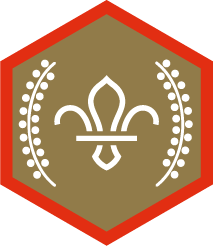Awarding top awards
You’ll need
- A4 paper
- Pens or pencils
- Bowls
- Chief Scout’s Gold Award badges
This isn’t the only way to give people their Chief Scout’s Gold Awards. There’s no one right way to do it – some people have joint ceremonies across a County or District, others have a yearly event to bring together all the sections in a group. The most important thing is to remember that each person’s Chief Scout’s Gold Award represents their personal journey and means something unique to them.
Before you begin
- The most important thing is to remember that each person’s Chief Scout’s Gold Award represents their personal journey and means something unique to them.
- Most people give out top awards at end of a Scout’s last term – it’s a great way to say ‘goodbye’ and ‘well done’, and it also encourages younger Scouts to get stuck in and follow in their footsteps.
- It’s nice to invite parents and carers to see their Scout get their award. Make sure you give them a few weeks’ notice so they can do their best to be there. It might be a good idea to take a moment during the ceremony to thank parents for supporting their Scout and their group, whether they’ve volunteered, helped out in other ways, or just supported their Scout to turn up and do their best.
Get ready for the ceremony
- Everyone receiving the award should write a memory of their time in Scouts on a piece of paper. It’s up to them what they choose – it might be a camp, event, or activity they really enjoyed, or a really funny moment. They shouldn’t write their name on it.
- Everyone receiving the award should fold up their memory and put it into an empty bowl.
- At the same time, the person leading the activity should write the names of the Scouts receiving the award on pieces of paper. They should write one name at the top of each sheet, then fold it over so just the name is facing up (and the rest of the sheet is face down on the table).
- Everyone else should take it in turns writing a kind compliment about, or favourite memory with, the people whose names are on the paper. After each person writes their compliment or memory, they should fold the paper so the person’s name stays face up but their comment is folded away (a bit like a paper fan).
You may want to make an example, to help everyone get the idea.
- The person leading the activity should collect in the paper fans. They should check to make sure no one’s written anything unsuitable, then put them somewhere safe so they can hand them out later.
Time to award
- Everyone should gather in a horseshoe shape.
If you have Patrols, everyone could stand in them.
- The person leading the activity should choose a folded up memory from the container and read it out.
- Everyone else should try to guess who the memory belongs to. After two guesses, the person whose memory it is should put their hand up. If they want to, they should share a bit about their memory and why they chose it.
- The person whose memory it was should join the people leading the ceremony. They should take a moment to celebrate the Scout’s hard work and say something memorable about them – what makes them special?
- The people leading the ceremony should hand them their badge, shake their (left) hand, and say well done. Then, the Scout should return to where they were standing.
- Everyone should repeat steps two to five until all of the Scouts have received their awards.
- The person leading the activity should give all of the Scouts their pieces of paper, full of compliments and nice memories. They should look at them and reflect – if they want to, they could share some of the things that were written down.
Reflection
This activity was all about reflecting on experiences and good memories. Doing this can help make friendships stronger and make people feel more confident. How many of people’s memories involved their friends? Looking back on memories, and remembering how important friends are, can help people feel more connected to others in their community.
Everyone receiving an award was given a piece of paper with lots of kind messages. Can anyone who got an award share how the kind messages made them feel? It may have made them feel good about themselves or reminded them of their strengths. Everyone who received an award was different, but people had plenty of nice things to say. Everyone should think about their own strengths – what kind things do they think people would’ve written about them?
Safety
All activities must be safely managed. You must complete a thorough risk assessment and take appropriate steps to reduce risk. Use the safety checklist to help you plan and risk assess your activity. Always get approval for the activity, and have suitable supervision and an InTouch process.
It’s OK to give clues if people struggle to guess who wrote down each memory. Let people have more (or fewer) guesses depending on how many people wrote down memories.
Not everyone is comfortable speaking in front of others, and that’s OK. Check in with the people receiving awards to see if they want to talk more about their favourite memory – then you can give them chance or just move on. Anyone who doesn’t want to speak could write down something for a friend or adult to read out on their behalf.
If anyone struggles with writing, an adult could help them write down their memory (then keep it a secret). Spelling doesn’t matter too much, so encourage people not to worry.
All Scout activities should be inclusive and accessible.
